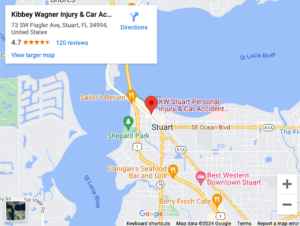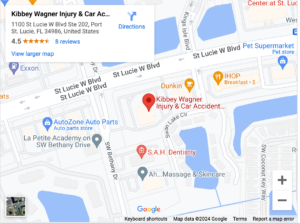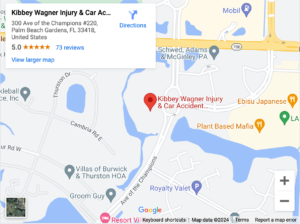
An injury accident, even if someone else caused it, can result in many different woes – including physical pain and suffering, emotional distress, and financial problems. Your own insurance company might cover your losses, or you might have a personal injury claim against the at-fault party.
This compensation is theoretical until the insurance company actually pays your bills. Meanwhile, you might need to pay certain expenses directly out of your pocket, claim them as “out-of-pocket expenses,” and wait for reimbursement.
How Can I Get Reimbursed For My Expenses After An Accident?

To obtain reimbursement for your expenses, you will need to either negotiate with the insurance company (or, in some cases, the defendant) or win a personal injury lawsuit. Either way, it will be up to you to establish that your expenses were (i) necessary and (ii) reasonable.
Your expenses might be necessary if, for example, you receive medical treatment for a worsened pre-existing condition. Alternatively, the insurance company might consider them unreasonable if you resort to an unproven medical treatment such as homeopathy.
What Are Examples of Out-of-Pocket Expenses?
Your compensation claim should include more than one category of losses – such as medical expenses and lost earnings. Out-of-pocket expenses typically do not fit neatly into any of these categories, which is why they have their own category. Some commonly claimed out-of-pocket expenses that arise from personal injury accidents are miscellaneous medical expenses, travel-related expenses, child care, and personal care.
Miscellaneous Medical Expenses
Miscellaneous medical expenses might include:
- Deductibles and copays
- Over-the-counter medications or prescription drugs
- Medical equipment
- Alterations to your home or vehicle to accommodate a disability
Closely monitor your treatment-related expenses to make sure you don’t overlook any of them.
Travel-Related Expenses
It is easy to overlook travel-related expenses that go beyond simple property damage, especially if your injury did not arise from a car accident. Below is a description of some commonly overlooked expenses.
Towing Charges
If your car is totaled after an accident, you must have somebody tow it to a garage for repair or disposal. Towing companies charge money for their services, and you may qualify for reimbursement.
Storage Costs
If your car goes to a garage instead of to your home, you will have to pay storage fees until someone repairs your car or sends it to a junkyard. You may have to wait for the insurance company to examine your car to determine its fate. If this happens, every day will be a new expense.
Car Rental or the Cost of Alternative Transportation
You may need another vehicle while your own car is in storage. You might also need to rent a car until yours is repaired or replaced. Renting a car is not cheap, and you will also have to pay for gas. If you need a car to get to work or to doctor’s appointments, it will probably be easy to establish that your car rental expenses are necessary and reasonable.
If you cannot rent a car, you might need to get around by rideshare, bus, train, subway, etc. These modes of transportation are cheaper than renting a car, but they still cost money. Taxi fares (if necessary) are even more expensive. You might also need to pay tolls and transportation pass fees.
Medical Treatment-Related Travel Expenses
You may have to travel out of town to receive medical treatment, therapy, or rehabilitation services. If your destination is far enough, you will also need money for accommodation. Hotel expenses are subject to the “necessary and reasonable” rule – an inexpensive motel should be fine if you stay out of town. Still, an expensive suite is probably unnecessary.
Child Care
You may spend time in the hospital undergoing medical treatment. Whether you do or not, you will probably need to spend some time at home recovering. If you have children to take care of, you might face a situation where you cannot even take care of your own needs, much less your children’s needs.
Unless you have a relative or a friend to help you, you may need to seek professional care for your children. Child care is particularly expensive, and it is absolutely necessary. These expenses add up quickly, and the insurance company will likely expect you to prove they are reasonable.
Personal Care
If you suffered a serious injury, you might lack the ability to perform daily tasks such as bathing, dressing, or cooking. You might also need nursing care after you leave the hospital. In-home care might be necessary, and it will probably be expensive.
How to Prove Out-of-Pocket Expenses in a Personal Injury Claim?
You can only receive reimbursement for expenses you can prove. Keep every receipt, invoice, bill, and any other documentation, whether online or offline. A good rule of thumb is – when in doubt, keep it.
A Stuart Personal Injury Lawyer Can Help You Identify and Document Out-of-Pocket Expenses
An experienced personal injury lawyer can help you identify and calculate your losses. Out-of-pocket expenses frequently arise in personal injury claims.
At Kibbey Wagner Injury & Car Accident Lawyers our personal injury lawyers will not charge you a dime for an initial consultation – in fact, most won’t charge you unless they win your case. You have very little to lose by letting a personal injury attorney take a look at your claim. Call us today at (772) 444-7000,




